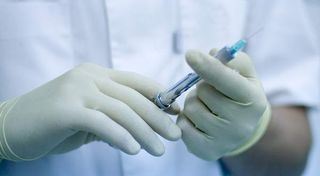Boys Should Get HPV Vaccine Too, CDC Says

A vaccine originally intended to prevent cervical cancer in girls should be given to boys as well, an advisory panel for the Centers for Disease Control and Prevention (CDC) said today (Oct. 25).
The panel voted to recommend the human papillomavirus (HPV) vaccine be given to boys ages 11 to 12. The vaccine is already recommended for girls of this age.
The rationale behind the recommendation is that the vaccine prevents genital warts and anal cancers in males, both of which can be caused by HPV. The vaccine may also prevent head and neck cancer, which has been on the rise in recent years.
In addition, vaccinating boys may help reduce cervical cancer in women. If males do not acquire the infection, they cannot pass it to females.
The new recommendation "will be a hugely important step in cancer prevention in this country, both for girls and for boys; women as well as men," said Dr. William Schaffner, chairman of the department of preventive medicine at Vanderbilt University, in an interview before the vote. Because rates of HPV vaccination in girls have been low, it's important to vaccinate boys as part of the public health strategy to prevent cervical cancer, Schaffner said.
Although the vaccine has been licensed by the Food and Drug Administration for boys ages 9 to 26, only about 1 percent of males in this age group have received it, said Dr. Paul Offit, chief of the director of the Vaccine Education Center at the Children's Hospital of Philadelphia. After this new recommendation, that percentage should increase dramatically, Offit said.
Benefit for boys and girls
Sign up for the Live Science daily newsletter now
Get the world’s most fascinating discoveries delivered straight to your inbox.
Two of the most common strains of HPV (HPV 16 and 18) cause about 21,000 cancers per year in the United States. One-third of these cancers are in males, according to the CDC.
There are now studies showing the vaccine is effective at preventing genital warts and anal cancers caused by HPV.
And although the vaccine has not been proven to prevent head and neck cancers, which can also be caused by HPV, the recent rise in cases of these cancers likely factored into the panel's reasoning for the recommendation, Schaffner said. Between 1988 and 2004, there was a 28 percent increase in oropharyngeal cancer, a type of head and neck cancer, said Dr. Lauri Markowitz, a member of the CDC committee on HPV vaccines.
In addition, it wasn't previously clear whether vaccinating boys as a means to prevent cervical cancer in girls would be worth the cost. If every girl was vaccinated, the benefit of vaccinating boys would be minimal, and come at a high price, researchers reasoned.
However, new research shows only about 32 percent of U.S. girls receive all three shots of the HPV vaccine (three shots are thought to be optimal for HPV prevention). This low rate of vaccination rate in girls means "it becomes much more sensible to vaccinate the boys also," Schaffner said.
Schaffner also pointed out that the new recommendation will protect men who have sex with men – a group that would not be protected from even a high rate of vaccinations among girls and women.
Getting parents onboard
Some say the new recommendations are overdue.
"The HPV vaccine should have been recommended for boys at the same time it was recommended for girls," in 2006, Offit said. At that time, "We knew the vaccine prevented infection in boys," he said. "Therefore, there was every reason to believe it would also prevent cancer, because infection is a prerequisite to cancer."
Getting parents to be comfortable with the idea of a vaccine for young children that is intended to prevent a sexually transmitted disease may prove just as difficult for boys as it was for girls, Schaffner said. But he emphasized that, in order to prevent infection, vaccination needs to occur before people become sexually active.
"The plan with any vaccine is to protect against the disease before the exposure," Schaffner said. "We should not wait for people to initiate their sexuality before vaccinating them against a virus that is spread sexually," he said.
Pass it on: Boys ages 11 and 12 should receive the HPV vaccine, a CDC panel says.
This story was provided by MyHealthNewsDaily, a sister site to LiveScience. Follow MyHealthNewsDaily staff writer Rachael Rettner on Twitter @RachaelRettner. Find us on Facebook.

Rachael is a Live Science contributor, and was a former channel editor and senior writer for Live Science between 2010 and 2022. She has a master's degree in journalism from New York University's Science, Health and Environmental Reporting Program. She also holds a B.S. in molecular biology and an M.S. in biology from the University of California, San Diego. Her work has appeared in Scienceline, The Washington Post and Scientific American.
Most Popular

